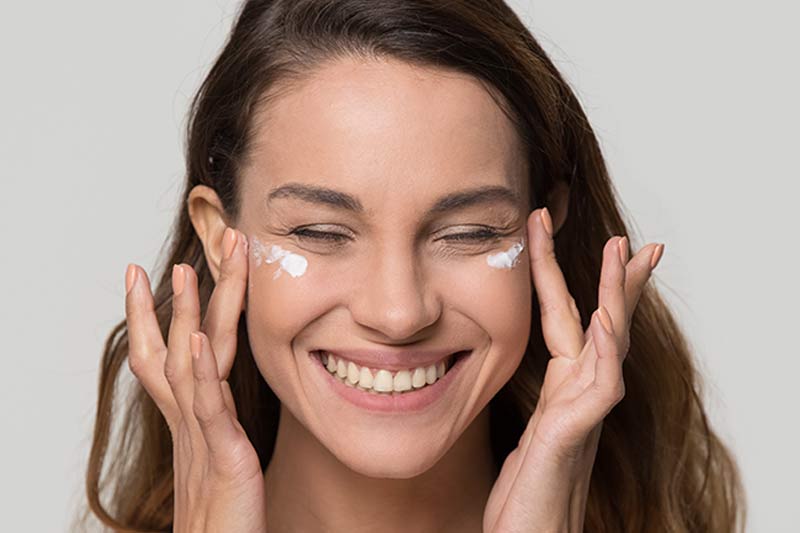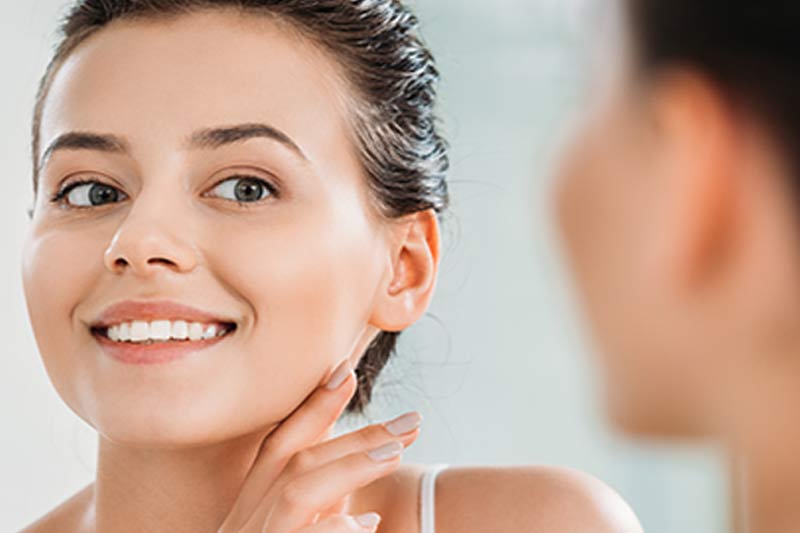Copper peptides are powerful allies in the fight against skin aging. They restore lost collagen, address various other skin concerns, and are suitable for all skin types. The unique copper-and-amino-acid blend provides potent antioxidant protection that helps neutralize oxidative damage.
Learn how to use copper peptides for the skin and what benefits and side effects to expect.

What are Copper Peptides?
Copper peptides (GHK-Cu) are short chains of amino acids with copper ions. These naturally occurring protein building blocks support the skin’s structure by stimulating the production collagen and elastin, promoting tissue repair, and evening out skin tone.
Natural copper peptide levels decline as we age. The skin becomes visibly thinner, loses elasticity, and becomes prone to damage. Incorporating products with copper peptides into your skincare routine can help replenish reserves and restore a more youthful look.
What are Copper Peptides in Skincare?
GHK-Cu-based products are ideal for sensitive skin types due to their antioxidant properties, which reduce inflammation, prevent further damage, and alleviate the symptoms of acne, eczema, and rosacea.
Serums, moisturizers, creams, and face masks with copper peptides reduce oxidative stress and help to alleviate the signs of aging.
If the product contains this ingredient, the label lists it as either copper peptides, GHK-Cu, or copper tripeptide-1.
Benefits of Copper Peptides for Skin
Copper peptides are powerful antioxidants with a plethora of skin benefits, including the following:
- Collagen stimulation
- Reduced hyperpigmentation
- Firmer, plumper skin
- Rejuvenated skin
- Reduced inflammation
- Improved skin tone
- Anti-inflammatory effects
- Antioxidant properties
- Promoted wound healing
- Enhanced hydration
- Reduced acne scars
Side Effects of Copper Peptides
Copper peptides are a low-risk skincare ingredient, but they may cause the following allergic reactions:
- Skin irritation
- Redness
- Hives
- Itchiness
- Burning sensation
- Purging pimples
Copper peptides are non-comedogenic, which means they do not clog pores or cause acne breakouts. However, the skin might flare up if the formulation contains other pore-clogging ingredients.
Since copper is a trace mineral required in minimal doses, excess intake can cause nausea, gastrointestinal issues, and other health problems.
How to Use Copper Peptides
Copper peptides are available as cleansers, moisturizers, and serums. A certified dermatologist can help determine the products, dosage, and application style based on your skin’s condition.
Follow these guidelines to maximize copper peptides’ rejuvenating effect.
- Choose the formulation – Facial moisturizers help seal in the hyaluronic acid and can boost hydration, while serums contain a higher concentration of copper peptides and provide faster results.
- Test before use - Perform a patch test by applying a small amount behind your knee or inside your elbow. Wait for 24 hours to see if you have any allergic reactions.
- Clean your skin - Thoroughly cleanse your face with gentle products suitable to your skin type.
- Apply a small amount – Gently massage the product into slightly damp skin and pat dry. Focus on areas of concern, such as wrinkles, creases, or dark spots.
- Add other skincare products – Layer the products correctly to ensure optimal absorption of all active ingredients, including copper peptides. Use our ultimate skincare guide to create your own beauty routine.
- Use consistently – Apply the product on alternate days, ideally at night. Gradually increase to daily application. Maximum recommended dosage is twice a day.

Copper Peptides - Frequently Asked Questions
It is important to learn how copper peptides work before you incorporate them into your skincare routine. Read the answers to the most frequently asked questions to decide if this skincare ingredient is suitable for you.
What Do Copper Peptides Do for Your Skin?
Copper peptides promote skin regeneration by stimulating collagen production, resulting in fewer wrinkles and a plumper look. Their wound-healing qualities help repair old, damaged tissue and encourage the regrowth of new, healthy tissue. Furthermore, through antioxidant activity, copper peptides help neutralize free radicals and protect the skin from harmful effects, such as UV radiation and pollution. They also help even out your skin tone, reducing the appearance of scarring and age spots.
What Can You Combine with Copper Peptides?
Pairing copper peptides with ingredients suitable for your skin type and issue can increase the desired effect and prolong the results.
Humectants, such as hyaluronic acid and glycerin, enhance peptides’ performance by ensuring better moisture retention. These hydrating agents draw moisture, leaving the skin firm, plump, and well-hydrated.
You can also combine copper peptides with niacinamide to ease inflammation, reduce redness, and brighten your skin complexion.
Are Copper Peptides Better Than Retinol?
Both ingredients offer unique benefits and can help improve overall skin health. The choice depends on your skin type, concerns, and health goals.
Retinol is a form of vitamin A that helps reduce wrinkles, acne, and uneven skin tone. It exfoliates the skin, helps unclog pores, regulates sebum levels, and increases collagen production.
It is suitable for all skin types but is particularly effective for acne-prone, aging, and hyperpigmented skin.
Note: Learn how retinol serums and creams differ to choose the appropriate formulation.
Are Copper Peptides Better Than Vitamin C?
Both ingredients offer valuable skin benefits, and the choice depends on your skin’s condition, skincare goals, and preferences.
Topical vitamin C is a powerful antioxidant essential for wound healing and cell turnover. It stimulates collagen synthesis to improve skin texture, reduces dark spots, and minimizes the aging signs. The result is a brighter complexion, even skin tone, and a firmer appearance. It is suitable for all skin types, including acne-prone, aging, oily, and dry.
With What Should You Not Mix Copper Peptides?
Some skincare ingredients can compromise copper peptide activity by breaking the bonds between them. Avoid using the following agents as they can reduce the effectiveness of copper peptides:
- Vitamin C (i.e., ascorbic acid)
- Retinol
- Alpha hydroxide acids, or AHAs (e.g., glycolic acid)
Ask your dermatologist if you can use these ingredients on alternate days to avoid undesired effects and maximize the results.
Conclusion
Copper peptides are a versatile addition to skincare and can visibly improve skin health with regular use. Their distinctive properties help to reduce inflammation, promote cellular turnover, and stimulate collagen production.
It is important to remember what ingredients to add and avoid while using copper peptide-infused serums, creams, and moisturizers.
Contact Vibrant Skin Bar’s skin expert team with more questions on this topic.


